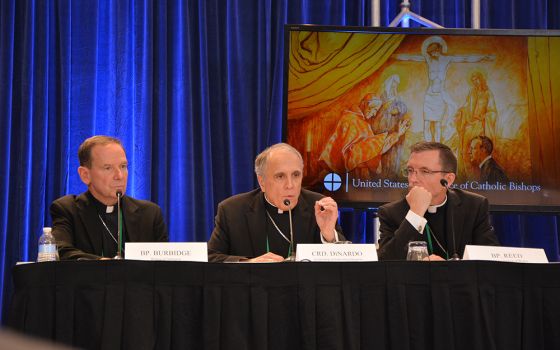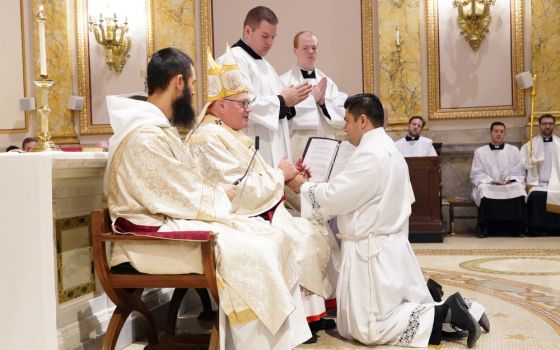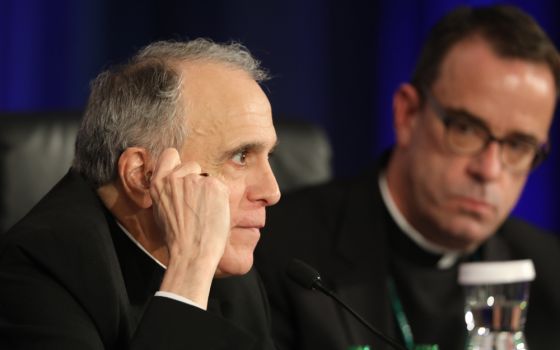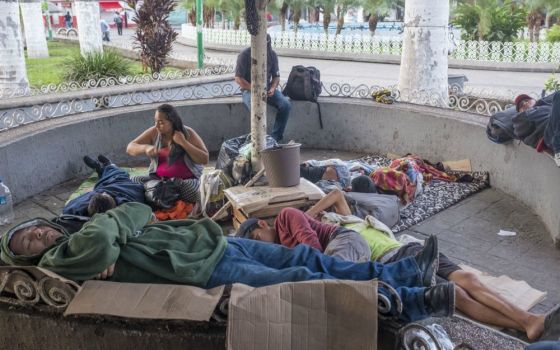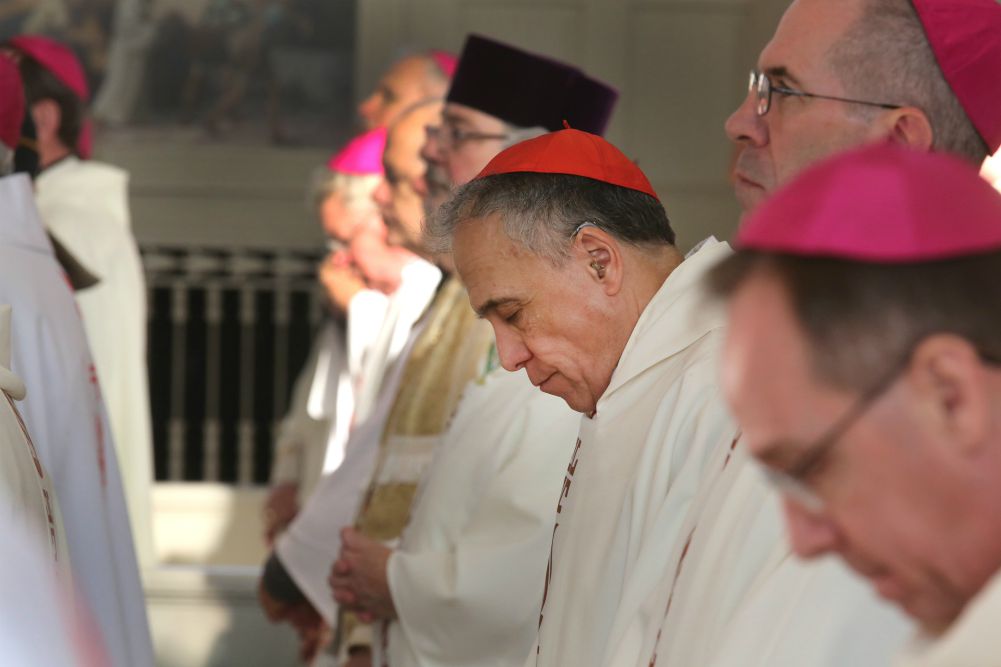
Cardinal Daniel DiNardo of Galveston-Houston, president of the U.S. Conference of Catholic Bishops, during Mass in the Chapel of the Immaculate Conception at Mundelein Seminary at the University of St. Mary of the Lake in Illinois, near Chicago, Jan. 3, 2019. (CNS/Bob Roller)
A week from tomorrow, the U.S. bishops will gather in Baltimore for their annual spring meeting. The principal item on the agenda is the enactment of new policies regarding the sexual abuse of minors and vulnerable adults.
Last autumn, you will recall, the bishops planned to take action on several items to address the crisis but the Vatican ordered them not to vote on any proposals until after they had taken a retreat together, which they did in January, and until the conclusion of the February summit of bishops from around the globe called by Pope Francis to focus on this issue. There was a hue and cry about the Vatican's intervention, and Cardinal Daniel DiNardo, president of the conference, was visibly perturbed by the Vatican's decision, and the fact that it came at the last minute. As I wrote at the time: "[W]hen the bishops began discussing the proposals on Nov. 13, it quickly became obvious that the proposals were ill-conceived and would have fallen apart on their own, without any help from Rome." They were lacking in clarity and pastoral focus.
In the intervening eight months, the Holy See has addressed the sex abuse issue with astonishing speed by Vatican standards, and Francis has made the bishops' job next week much, much easier. Within three months of the February summit of bishops, Francis issued an apostolic letter motu proprio (on his own initiative), Vos estis lux mundi, which set universal norms for the entire Catholic Church. The document requires all episcopal conferences to enact policies and protocols to address clergy sex abuse, and it demands that those policies extend to the bishops themselves. It requires the relevant dicasteries of the Holy See to work with bishops' conferences to investigate allegations against bishops in a timely manner. Perhaps most importantly, Vos estis treats the covering up of abuse in the same manner as the abuse itself.
The only thing left for the U.S. bishops' conference to determine is how to implement the pope's directives, and the broad outlines are obvious. There will be some kind of third party reporting mechanism, to whom a victim can make an allegation. That report will go to the apostolic nuncio, to the metropolitan archbishop and to either the metropolitan's review board, or a review board established by the bishops of the ecclesial province, or an individual the bishops of the province have designated to provide an initial assessment of the claim. That means that there will be lay involvement from the outset. Once the allegation is deemed credible, it is referred to the relevant dicastery in Rome, which will authorize the investigation and set appropriate parameters. The results of the investigation go to Rome, and the pope decides how to proceed. In recent days, the metropolitan archbishops of the country have been consulting with each other about these slightly different approaches.
I suspect there will be, and should be, some discussion about the need for review boards to include lay experts in handling allegations of a cover-up, which might require a different set of analytical skills from those needed to assess an allegation of abuse itself. That is hardly an insurmountable burden.
Advertisement
What will not happen, and which some bishops wanted last November, was a new, distinct nationwide organization, consisting primarily of lay people, with its own legal status separate from ecclesiastical structures. The bishops can't farm out responsibility and, more worryingly, you can imagine that such a body would soon be populated by, or heavily influenced by, those who fund it. The last thing we need is to have the Knights of Columbus under its current leadership — or the wealthy folks running the Napa Institute — vested with oversight power of bishops. Their ideas about reform would likely focus on scapegoating gays and those prelates they do not like. Last November, it was more than a little ironic to hear conservative Fort Worth, Texas, Bishop Michael Olson denounce former Cardinal Theodore McCarrick, who was not in attendance, and urge the bishops to adopt a resolution that he would no longer be welcome at their meetings, without voicing any objection to the presence of Bishop Robert Finn, the former bishop of Kansas City-St. Joseph who was seated a few seats away from Olson. In 2012, Finn was convicted of a misdemeanor for failing to report suspected child abuse.
I am confident the bishops will come to a fairly prompt resolution of the outstanding issues and enact implementing policies in short order. This time, thanks to Francis, they can do what they were not able to do at their 2004 Dallas meeting: apply the rules governing sexual abuse to themselves.
In addition to the issue of clergy sex abuse, the bishops will hear a report from the working group on Faithful Citizenship, the quadrennial document on the voting responsibilities of Catholics. As I noted last week, the bishops should discuss strengthening their treatment of the issue of character in the supplemental materials they are preparing in advance of the 2020 election. Consider the president's obsession with denigrating the reputation of Sen. John McCain. Consider the fact that the president and most of his staff lie every time they open their mouths. I understand that it was wrong for Franklin Roosevelt to carry on with Lucy Mercer, who was not his wife, but he kept his character defects in the personal realm. This president's character defects afflict his public life and they do so daily. John Kasich has figured this out. Will our bishops? Christian anthropology demands a response to the amoral and immoral behavior of the president.
The bishops must also use the occasion of their meeting to creatively determine ways to defend immigrant families being attacked by the administration's policies. Not to put too fine a point on it, but if there is no Latino Catholic future for the Catholic Church in the United States, there is no future. If the bishops are not willing to stand with Francis and defend our immigrant brothers and sisters, the malpractice will be as great as that evidenced in their initial handling of clergy sex abuse, and they should really find another line of work.
Immigration is the touchstone of a larger cultural narrative, one that was on display in last week's European Parliament elections as well as on President Donald Trump's Twitter feed every day. In the early decades of the 20th century, the Catholic Church was far too willing to support authoritarian regimes, support that left them unable to confront the evils that followed when those authoritarian regimes turned totalitarian. Is the 21st century to see a repeat? Francis is the most visible bulwark against both the rising tide of ethnic, racial nationalism and the neo-liberal economic and political regime that makes such reactionary politics possible. Will the bishops stand with him? This should be an easy question to answer but it is not.
I had not anticipated much discussion of the forthcoming apostolic constitution reorganizing the Vatican curia, but last Thursday night, on EWTN's "The World Over" with Raymond Arroyo, his guest George Weigel trashed the proposed text in such fulsome terms, I expect those bishops who are fans of EWTN and Weigel will be sharing their disgruntlements if not in open session, then at least during the coffee breaks. Instead of taking Weigel's verdict as their own, the bishops should invite Cardinal Sean O'Malley, who helped draft the reorganization plan, to explain why the Holy Father and his Council of Cardinals decided to make the changes they are making.
In a sense, the U.S. bishops' conference has lost much of its influence in the last 20 years. The organization threw in its lot with the cultural warriors among the bishops just when it was becoming obvious to most of us that the culture warrior approach doesn't work and, more importantly, bears little resemblance to the Gospel. For several years, "religious freedom" has been the main battle cry coming from the leadership of the conference, and an annual "Fortnight for Freedom" was launched to protest government interference in the life of the church and its ministries.
Now, due to the lack of accountability among many bishops, chanceries are being raided by the police, a degree of government interference once thought unimaginable. On Capitol Hill, the bishops have lost much of their influence. The people in the pews certainly pay little heed to the bishops in choosing political candidates or in choosing birth control. Still, the organization matters to the internal life of the church, some of its committees continue to do great work, and there are some staffers whose dedication to the church is both admirable and effective. But, it is a remarkable fact that most of the heavy lifting on clergy sex abuse was done outside the formal structures of the conference.
Someday, and someday soon, there will be enough bishops who support Pope Francis that the U.S. Conference of Catholic Bishops might recover the vitality it had in the days of Archbishops Hanna and McNicholas, and of Cardinals Mooney and Stritch and Bernardin. But that day will not come next week. By this time next year, when there are new archbishops in Anchorage, Philadelphia and Atlanta, and perhaps in St. Louis, the direction of the conference should begin to change. Not a moment too soon.
[Michael Sean Winters covers the nexus of religion and politics for NCR.]
Editor's note: Don't miss out on Michael Sean Winters' latest: Sign up and we'll let you know when he publishes new Distinctly Catholic columns.




